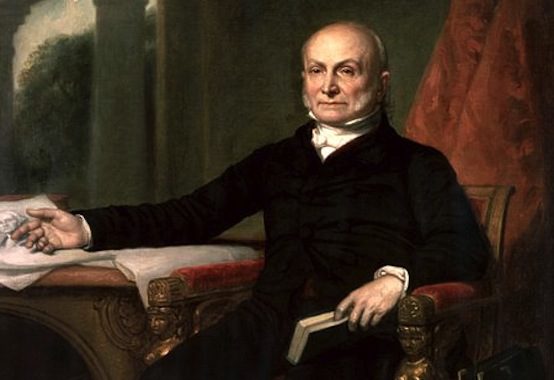Restraint and the ‘Actual Legacy’ of John Quincy Adams

Hal Brands is eager to reclaim John Quincy Adams for the primacists:
Why does it matter what Adams said and did 200 years ago? Because the common misunderstanding of his role contributes to a larger misunderstanding of what U.S. foreign policy has been in the past and should be in the future. Advocates of a sharply curtailed foreign policy often contend that they are simply calling for a reversion to the time-tested American tradition of non-intervention and limited engagement with the world. They argue that Adams is representative of a more realistic statecraft that has been lost amid America’s alleged obsession with projecting its influence and values beyond its borders.
Uncovering the actual legacy of John Quincy Adams might make one think differently.
Some of what Brands says is true, but he overstates his case and tries to make Adams into a sort of neoconservative avant la lettre. He doesn’t prove that the “common misunderstanding” of Adams is a misunderstanding at all. Brands points out that Adams was a continental territorial expansionist. Like many American political leaders in his time, Adams supported expanding U.S. territory across North America. That is true as far as it goes, but Brands’ account conveniently ignores Adams’ later opposition to Texas annexation and the Mexican War when he served in Congress. Adams was in favor of expansion in general, but he opposed it in some very important, high-profile cases. He flatly rejected the Mexican War as a war of conquest, which he called “this most outrageous war.” That sounds like something advocates of restraint would like. That is his “actual legacy.” Adams’ support for expansion also seems remarkably irrelevant to the current debate over restraint vs. primacy. It’s also irrelevant to how Adams thought the U.S. should respond to foreign conflicts in other parts of the world. In his famous July 4 speech, Adams said:
She well knows that by once enlisting under other banners than her own, were they even the banners of foreign independence, she would involve herself, beyond the power of extrication, in all the wars of interest and intrigue, of individual avarice, envy, and ambition, which assume the colors and usurp the standard of freedom. The fundamental maxims of her policy would insensibly change from liberty to force.
Brands would have you think that Americans have been misunderstanding Adams’ position for almost 200 years, but that’s wrong. Adams is saying explicitly that the U.S. should not participate in the wars of other nations. That was his clear position. If the same Adams were here now, do we think that he would be more likely to agree with advocates of restraint or with primacists? Thomas Jefferson was also a great supporter of American territorial expansion, but no one thinks that this means that he would be in favor of anything remotely like U.S. primacy and interventionism today. We know very well that he would not be in favor of that, and there is every reason to think that Adams wouldn’t, either. More to the point, when contemporary non-interventionists cite Jefferson’s rejection of entangling alliances, they aren’t endorsing everything that Jefferson did when he was president. Likewise, non-interventionists and advocates of restraint can recognize the wisdom of Adams’ statements about the U.S. role in the world without necessarily approving of his entire record.
Brands’ argument really goes off the rails when he tries to retcon the Monroe Doctrine into a much more ambitious policy than it really was. He describes the Monroe Doctrine this way:
That went doubly for Adams’s other key diplomatic achievement. The Monroe Doctrine, issued in 1823, offered an assurance that America would not meddle politically in Europe’s affairs. But it also advanced the radical idea that the U.S. would not tolerate European efforts to establish new colonies in the Western Hemisphere, or to re-subjugate the nations that had just overthrown Spanish rule.
This was an astonishing assertion of American primacy.
He calls this radical and astonishing, but it was simply an acknowledgment of the status quo that existed at the time. It was a statement of non-interference in the internal affairs of other states and of ongoing neutrality in the conflicts between them. It committed the U.S. to nothing, and it was unenforceable in practice because the U.S. lacked the means to defend these countries if the need had arisen. The “actual legacy” of Adams was in affirming that the U.S. respected the independence and sovereignty of its neighbors, and that was a policy that he continued when he was president. That is the legacy that advocates of restraint are only too happy to continue. The Monroe Doctrine is probably one of the least well-understood statements in the history of U.S. foreign policy, and it is almost always hawks that misunderstand it because they try to turn it into something that it never was.
Brands would have you believe that the “past to which many proponents of restraint wish to return is more imagined than real,” but in fact there was a long period of time when the U.S. did not intervene in the conflicts of other states and that is the kind of foreign policy that advocates of restraint want to bring back. Of course, this isn’t really a debate over returning to the past, since that’s impossible, but of how the U.S. will conduct itself in the future. Adams offers us a model of the sort of peaceful foreign policy of noninterference that we want to have, but it will have to be a foreign policy that has been adapted to the realities of the present.
Comments